Despite six years spent behind bars, Crimean activist Server Mustafayev continues to resist the regime, filing lawsuits for the illegal seizure of his belongings and failure to provide medical care. In contrast, the journalist’s family, friends, and colleagues continue their tireless fight for his release.
“We met in 2015 after the first arrests: we met at the courts in the cases of Ilmi Umerov, Akhtem Chiygoz, Mustafa Degermedzhi, and others,” recalls Server‘s lawyer Lilya Gemedzhi in a comment to the National Union of Journalists of Ukraine (NUJU) news service. “He streamed from the places of searches and trials, went on the air, gathered people to discuss how to support those who are persecuted and subjected to searches. Server also raised the issue of helping children who were left without parents. He was always at the forefront – gentle, proactive, purposeful.”
According to the defense attorney, Server Mustafayev‘s eyesight has deteriorated significantly. He also has problems with his knee joints (he was given special orthopedic shoes to relieve the pain), and there is a lipoma on his chest. The activist is currently being held in a barrack with strict conditions. Server is almost constantly indoors, as his time for walks is significantly limited. He is not taken out to work, nor is he given the opportunity to study…
Crimean prisoner of conscience Server Mustafayev was born in May 1986 in the urban-type settlement of Ziyadin, Samarkand Region, Uzbekistan. While still young, he moved with his parents to Bakhchisarai in Crimea, where he began his studies. In 2002, he graduated from school and entered the Bakhchisarai Construction College at the National Agrarian University, from which he graduated with honors as a specialist in the operation of equipment and gas supply systems. From 2006 to 2012, he studied at Kyiv National University and received a master’s degree in heat and gas supply and ventilation. He worked at the Euroset company in Crimea and in Kyiv, later – at the Astelit company, and the Krymopt firm, and in 2014 he became the managing partner of the Dolce bakery chain. In 2009, Server got married. Now, the couple has four minor children: sons Yunus and Yusuf and daughters Dzhemile and Nadzhiye. The youngest knew her father only from photographs because, at the time of his arrest, she was still a baby. A few months ago, she saw her father for the first time in many years.
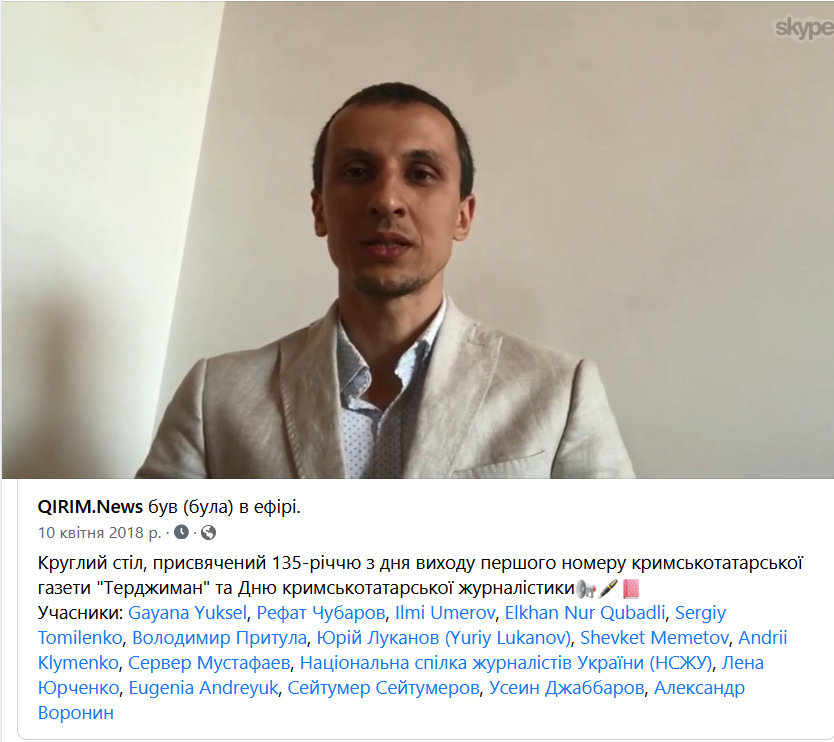
The journalist was active in public life in Bakhchisarai – he organized children’s holidays and public events and helped low-income families. Since 2014, he has been systematically monitoring the situation in Crimea, covering politically motivated trials, becoming not only one of the founders of citizen journalism on the temporarily occupied peninsula but also the voice of those who were trying to be silenced. In addition, he worked as a coordinator of the public association Crimean Solidarity, which provides legal, informational, and social assistance to the families of political prisoners in Crimea and is one of the forms of resistance of the Crimean Tatar people to the systemic repressions carried out by the russian authorities. By Decree of the President of Ukraine No. 335/2020, he was awarded the Order of Merit of the 3rd degree, and by Decree of the President No. 662/2021, he was awarded the Levko Lukyanenko State Scholarship.
On the morning of May 21, 2018, the police entered Server Mustafayev‘s house in Bakhchysarai without warning. The search lasted several hours: the security forces took all documents and electronic devices. During this period, Server was not given the opportunity to contact a lawyer. Then, he was detained and taken for questioning by the FSB.
Two years later, on September 16, 2020, the Rostov-on-Don Court of Appeal sentenced the Crimean for “participation in the activities of a terrorist organization” and “preparation for a violent seizure of power” to 14 years of imprisonment in a maximum-security colony. Later, in March, the Moscow Court of Appeals almost completely rejected the defense’s appeals and left the verdict unchanged. Server was charged with involvement in the activities of the russian-banned party Hizb ut-Tahrir (in Ukraine and most countries of the world, the organization is not banned: its activists published a newspaper, could openly speak in the media and held mass public events). According to human rights activists, members of this organization are being prosecuted not for preparing a coup d’état and terrorism, as stated in court verdicts, but for public actions of party supporters against political repression in Crimea, systematic criticism of the russian authorities, and mass disloyalty among Crimean Tatars in response to the annexation of Crimea in 2014.
In particular, the NUJU has investigated the case of Server Mustafayev in detail and has consistently and consistently advocated for the removal of all false charges from him and other colleagues illegally imprisoned by russia and their release from custody.
He was passionate about this case despite the risks and dangers
A Crimean Tatar human rights activist and journalist for the online publication Graty, Lutfiye Zudiyeva, met Server in person outside one of the Crimean courts. At the end of February, Lutfiye herself was also detained by police after a search of her home in Dzhankoi in Crimea. The journalist’s computer, phones, flash drives, a video recorder, and several collections of human rights texts were taken away. Zudiyeva was taken to the Simferopol police station, where two administrative reports were drawn up for posts on her personal Facebook page.
“I was still watching and thinking to myself: “What an energetic person, how passionate he is about this matter, despite the risks and dangers,” she tells the NUJU news service. “Many families of political prisoners in Crimea still remember him with special warmth because he was not just engaged in media work, not just trying to tell their stories. He was also a friend to them and tried to help with certain social and everyday issues. In his person, in some strange way, both a journalist, a human rights activist, and simply a close friend of these families were combined. And that is exactly how I know and remember him.”
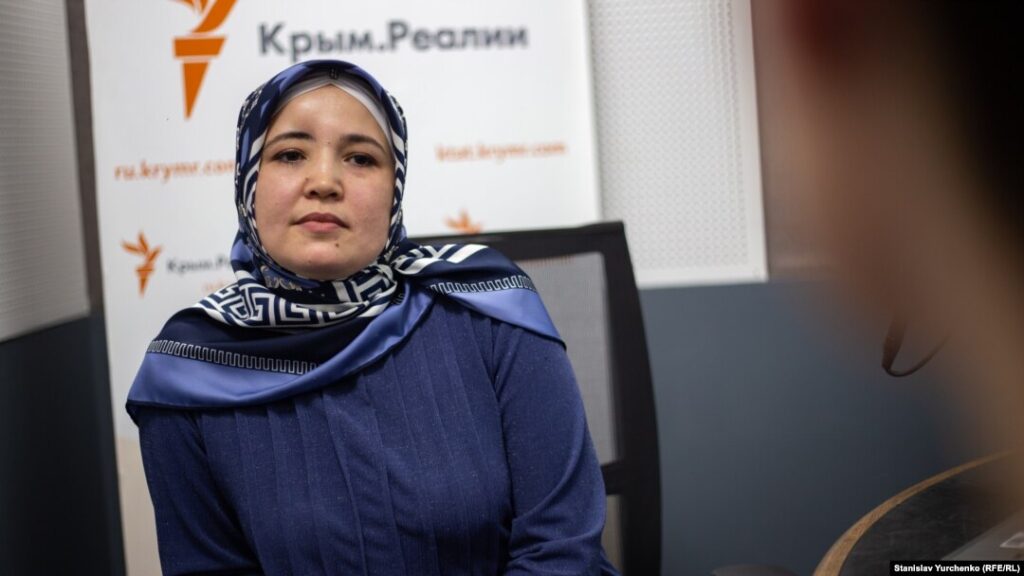
According to Lutfiye, since the beginning of the russian occupation of the peninsula, many citizen journalists have started live broadcasting on their own Facebook pages from courtrooms. This continues to this day. However, at the turn of 2016 and 2017, it became clear that it would be more convenient for journalists, human rights activists, and monitoring missions to follow some single verified source of information that would combine news and the results of various court hearings and talk about them.
“And it was at that moment that citizen journalists joined their efforts and formed a media direction within the framework of the public movement Crimean Solidarity,” says the journalist. “Perhaps it was from this moment that we can talk about the formation of such a phenomenon as the Institute of Citizen Journalism on the peninsula (Crimea) because later new people began to join this team. Some of our colleagues grew into professional journalists, began to cooperate with editorial offices, and received press cards.”
During a conversation with the NUJU press service, Lutfiye Zudiyeva explained that, first of all, there are two strategies for the release of Crimean political prisoners from russian prisons. The first focuses on personalizing and media coverage of specific individuals from the list of prisoners. Its goal is to make these names more well-known, telling in detail about each person: what they did before their arrest, what influence they had, and why they ended up in a russian prison. Supporters of the second strategy talk about more systemic phenomena: not about specific names and last names, but about general processes taking place in the territory of Crimea, systematizing these persecutions and repressions according to specific cases. They seek the release of people according to a general list and insist that civilians should not be exchanged at all: they should be released without any conditions and any bargaining with the russian federation.

“If we talk specifically about Server Mustafayev, then this is the first strategy: when much attention is paid to the name and last name of a person. And many very different organizations are demanding his release. He has been in prison for six years, and we are simply in standby mode (yes, it would probably be correct to say so),” says Lutfiye. “Server Mustafayev‘s name appears on many lists. They are maintained by the NUJU, the Institute of Mass Information, the Committee to Protect Journalists (CPJ, New York), and the European Federation of Journalists. His story is also closely followed by PEN Ukraine, fellow human rights activists from Amnesty International, and Frontline Defenders. That is, a huge number of organizations are talking about Server‘s case, his activism before his arrest, his conditions of detention, and his health now.”
“Together, we have done and continue to do what we must do next and lead it to an end. And suppose they forget or do not understand. In that case, we must tell the truth again and again, no matter how bitter it may be, even from the torture chambers of the Urals and Siberia.”
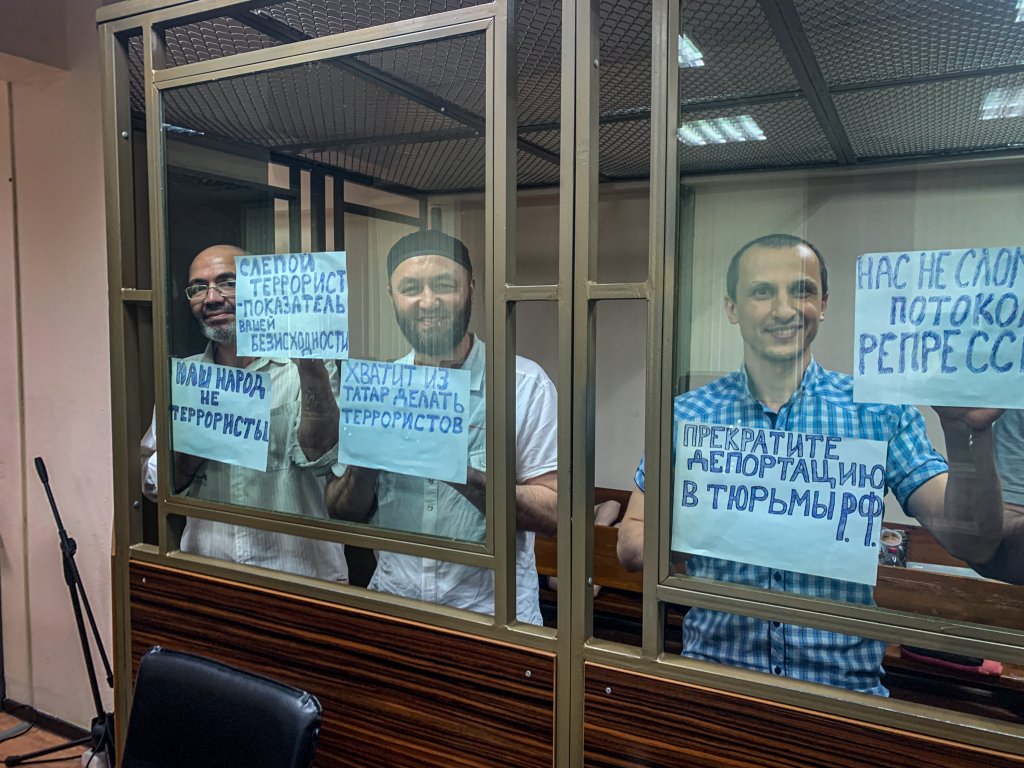
These words, in particular, were spoken by Server Mustafayev to his colleagues in the Court of Appeal in 2022. The NUJU is actively involved in public awareness of the illegal detention of Server and at least three dozen colleagues imprisoned by russia. In particular, in 2021, with the support of the European Federation of Journalists, the Union opened a photo exhibition called Citizen Journalists Matter! dedicated to Crimean Tatar journalists detained in occupied Crimea. The opening was attended by The photos were taken by political prisoners who told what is happening to their husbands on the russian-occupied Ukrainian peninsula. The authors of the photos were Oleksandra Yefimenko, Taras Ibragimov, Eskender Ghani, the public movement Crimean Solidarity, and the Radio Liberty project Krym.Realii and the publication Graty.
At that time, the European Federation of Journalists supported the call of NUJU and spoke out for the immediate release of all professional and citizen journalists who are being persecuted in the russian-occupied Crimea.
‘ We consider our colleagues as political prisoners. They are behind bars only for doing their work in the interests of society. As you know, the European Federation of Journalists has previously made statements of solidarity with Mykola Semena and Vladyslav Yesypenko, as well as Crimean Tatar citizen journalists. Be sure: we will continue to raise our voice against the repression of journalists in Crimea,” said the statement of the Secretary General of the European Federation of Journalists Ricardo Gutiérrez, distributed in December 2021.
With this photo exhibition, the Union summed up the results of the project Crimea In Focus, which it implemented with the support of the EFJ. It consisted of a series of analytical materials on the situation of Crimean Tatar colleagues and 10 webinars, which were attended by more than 1,400 participants – employees of national and regional media, students, and lecturers of journalism departments of 26 higher educational institutions of Ukraine. The speakers of the meetings were well-known journalists, human rights activists, and experts on Crimean topics who focused on raising awareness among Ukrainian journalists about the realities of the occupied peninsula.
At the opening of the photo exhibition at the Kyiv office of the NUJU, Server Mustafayev‘s wife, Maye, dared to approach the photographs of her husband and family only after the speeches at the official opening of the exhibition because she was afraid of not being able to contain her emotions. At that time, in a comment to the Union, she said: Server is very strong in spirit. He is ready to seek justice and, even in prison, continues his human rights public activities; he has also written several diaries. Maye recalled the words of her husband, who emphasized that most people mistakenly believe that their voice will not change anything. If they strive for more, it can become even worse because the system will break. But everyone makes their own choice. Server‘s choice is not to be silent!
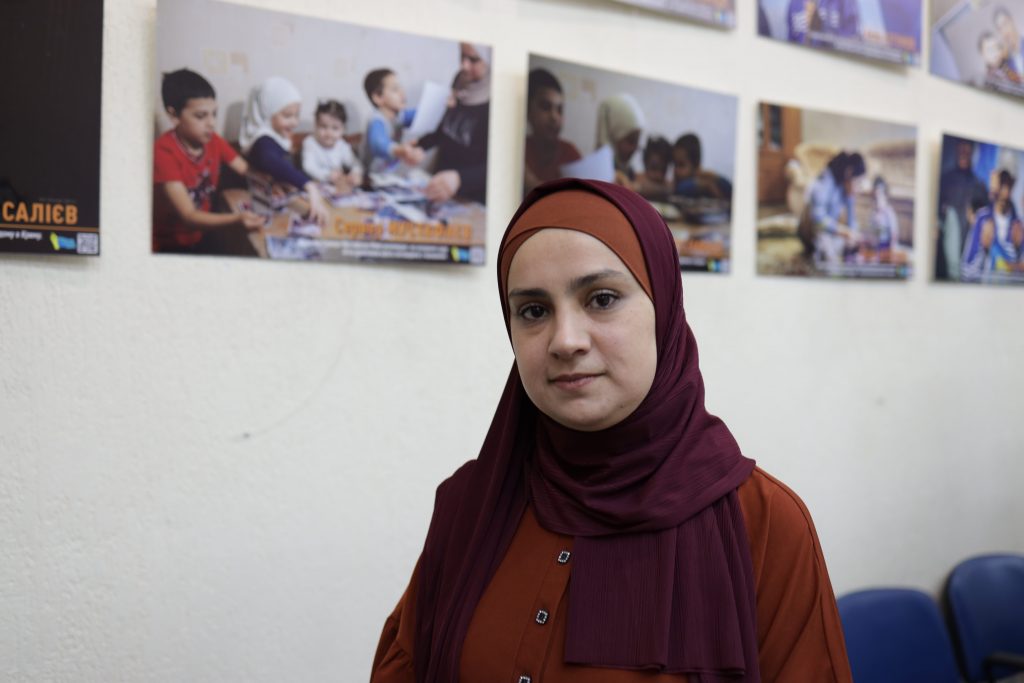
This is what Mustafayev wrote in his letter to NUJU President Sergiy Tomilenko, where he expressed sincere gratitude to all journalists for drawing attention to the fate of political prisoners and their families and called on media professionals to talk more about those whom russia “generally labels as ‘terrorists’ and ‘extremists’.” Maye Mustafayeva handed it over personally.
“I met with Server personally back in 2018; we discussed the security of citizen journalists in Crimea,” commented NUJU President Sergiy Tomilenko. “It is obvious that russia wants to stop uncontrolled reporting about the realities of occupied Crimea through repression. And our only tool for helping imprisoned colleagues is national and international journalistic solidarity. By talking about the fate of citizen journalists and their families, we strengthen the basis for governments and international organizations to make fair demands on russia to release our colleagues from behind bars.”
In a letter to the NUJU, the full text of which is provided at the link, Server Mustafayev called on Ukrainian journalists to get to know the families and children of Kremlin prisoners better and tell the world about them. According to him, every one of our journalistic community must write page after page every day, step by step, and not let this important topic fall off the agenda of all international platforms that are effective in resolving this issue: “Our unity is greater than fines, stronger than the automatic weapons of the tyrannical regime of the russian federation.”
In August, Server Mustafayev‘s entire family was able to have a long meeting with the imprisoned head of the family. As Maye reported, even in conditions of deprivation of liberty, her husband is engaged in human rights activities. Since he is familiar with jurisprudence, he helps his cellmates and other prisoners with advice on preparing documents and legal support for their cases.
Maye said that Server was interested in news about freedom, which is a breath of fresh air for him. He is used to always being with his people, being useful and needed by everyone. Therefore, it is very difficult for a journalist to be so far away now. He says that our people are united and continue their struggle no matter what.
Last year, in an exclusive interview that the NUJU prepared as part of the project called Journalists Matter. Stories of life and work in wartime with the support of the Swedish human rights organization Civil Rights Defenders, the wife of a political prisoner noted: “If in 1944 we were ‘traitors,’ now we have become ‘terrorists.'”
When Server was arrested in May 2018, his eldest daughter, Dzemila, was six. This year, a 12-year-old girl took part in the NUJU creative campaign titled I Am From A Family Of Journalists: she depicted a camera filming her father with a microphone near the police station and then behind bars… Children of other children also sent their original works. Crimean journalists who were legally repressed by the occupation regime are the son of Amet Suleymanov, and Safiye is the daughter of Marlen Asanov.
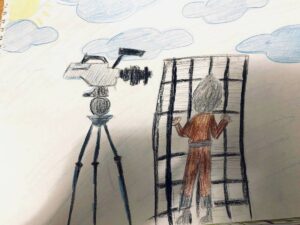
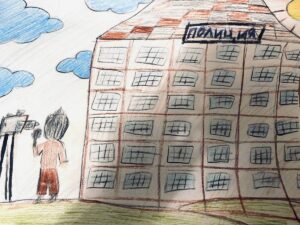
***
The NUJU is making every effort to release journalists who have become hostages of the russian totalitarian regime. In May, the influential European Federation of Journalists, which represents 300,000 media workers in Europe, at the proposal of the NUJU, adopted an appeal for the immediate release of Ukrainian journalists illegally detained by the russian federation. In addition, on April 24, the Verkhovna Rada of Ukraine adopted a resolution on captive journalists – hostages of the Putin regime, which was initiated by the head of the parliamentary committee on freedom of speech, Yaroslav Yurchyshyn.
“A well-known journalist/member of the NUJU, Iryna Levchenko, has been in russian captivity for more than a year. Dmytro Khyliuk was captured by the russians when they tried to occupy Kyiv back in 2022. Vladislav Yesypenko, Victoria Roshchina (unfortunately, her death in russian captivity was recently confirmed by the Coordination Headquarters for the Treatment of Prisoners of War – ed.), Iryna Danilovich, Server Mustafayev… – these are all the names of journalists whom russia must release without fail!” Sergiy Tomilenko, the President of the NUJU, called from the EFJ rostrum, showing portraits of imprisoned colleagues.
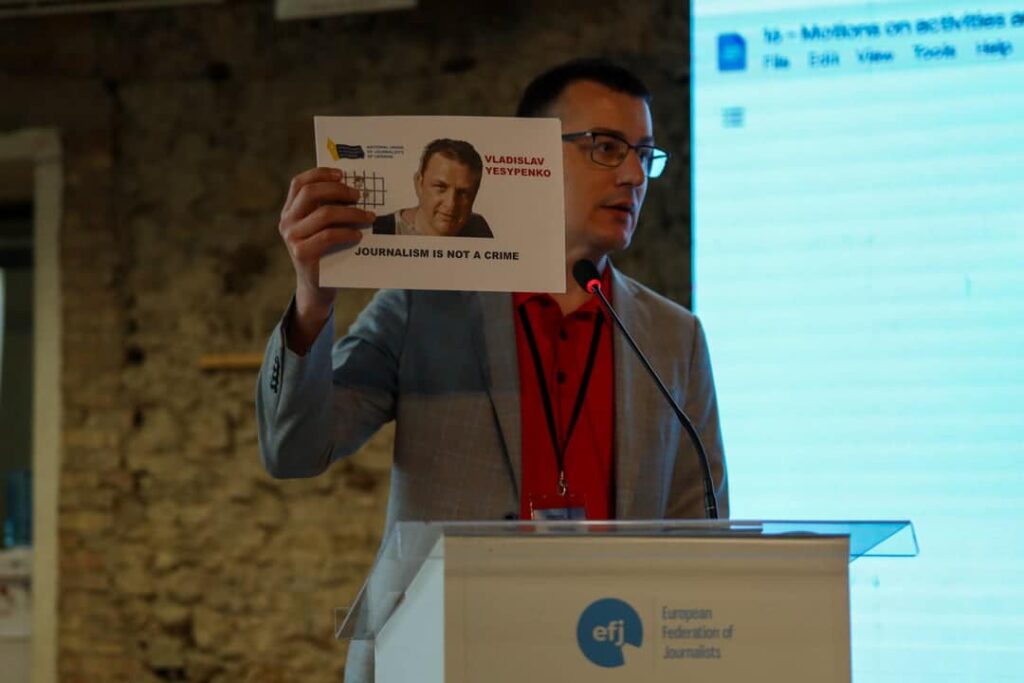
The appeal to the European Commission, the governments of European countries, the International Red Cross, and the EFJ members was unanimously adopted by the delegates of the Annual Meeting. You can read the text here. Also in May, Server Mustafayev was mentioned, expressing their support and faith in the release of his colleague during this year’s solidarity action of the National Union of Journalists of Ukraine. Sergiy Tomilenko, the President of the NUJU, and Lina Kushch, the First Secretary of the Union, emphasized, “We must continue to talk about colleagues who are currently in russian captivity. To do this, we must do everything to keep these important issues on the agenda both in Ukraine and abroad.”
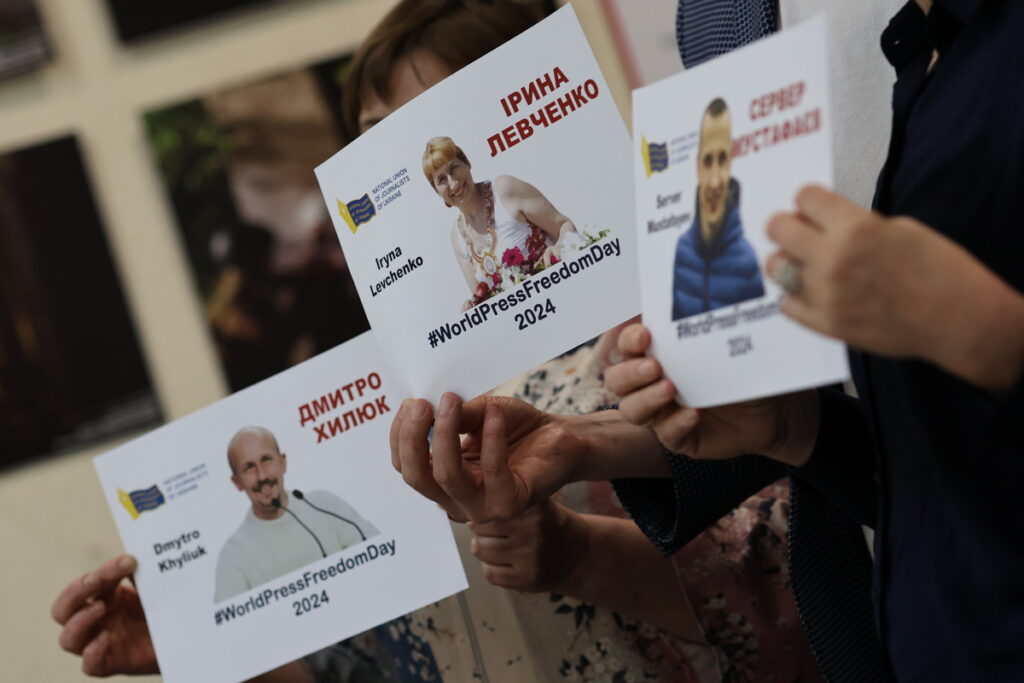
“The russian authorities are actively applying the experience gained in Crimea of repression against journalists with the involvement of fake courts in other occupied territories of Ukraine.“
This was stated in a statement adopted at a meeting of the NUJU Board on June 27. “Usually, media workers are charged under articles on terrorism, extremism, and in some cases, on intentions to overthrow the state power in russia,” the document states. “Instead of an objective, impartial examination of the case, the courts of the occupation authorities completely side with the accusation fabricated by the special services and do not take into account the arguments of the defense, passing sentences with sentences longer than those with which these same courts punish real murderers and terrorists. Therefore, most convicted journalists are transferred to serve their sentences deep inside russia, which further complicates access to these individuals.”
The NUJU board emphasized that russia cynically demonstrates that neither the requirements of international law nor people’s lives are an obstacle for it: the aggressor is committing the most serious crimes on the way to its goal – the destruction of Ukraine. The NUJU appeals to international organizations, governments of countries, primarily the countries participating in the International Summit in Switzerland, which signed the Memorandum of Peace, as well as member countries of the Crimean Platform association, calling on them to make every effort to stop the illegal russian aggression and release thousands of prisoners of the Kremlin, including dozens of Ukrainian journalists illegally convicted by russia.
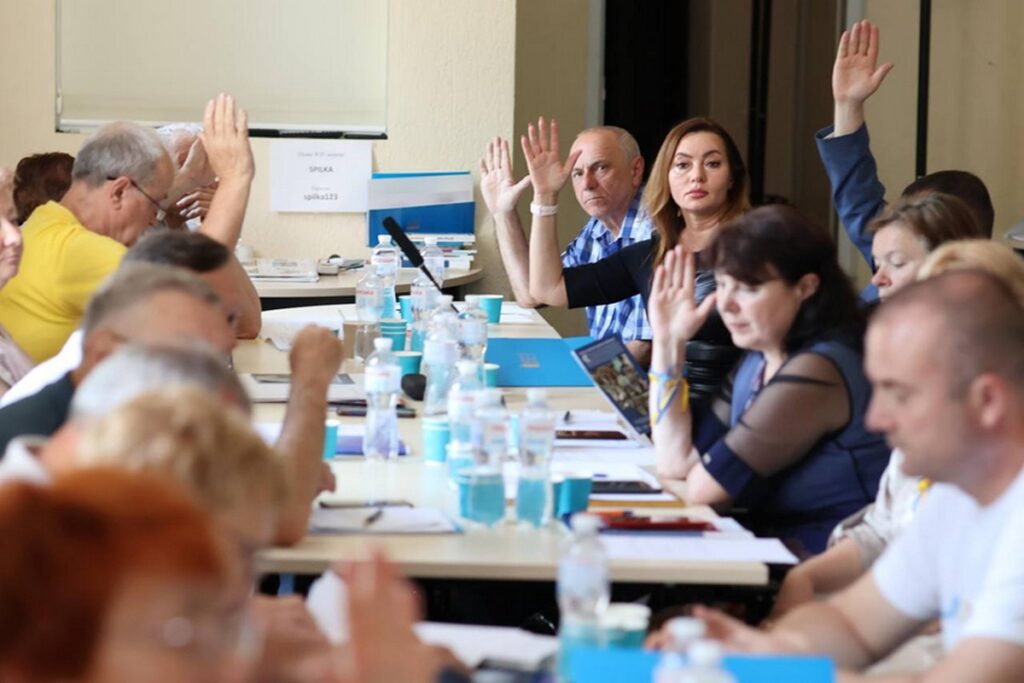
“On behalf of all imprisoned journalists, thank you for your attention and support! Do not stop and further demand the release of your colleagues! Journalists are important! Nariman Celal“
“Your attention and the attention of our society to the fate of journalists who carried out real informational resistance to the occupiers, who performed, I can say, a feat, is a guarantee that at least one more journalist’s name will be added to the list of those who will be released,” said the released Deputy Chairman of the Mejlis of the Crimean Tatar People, Nariman Celal, who spent almost three years in russian captivity, during his visit to the NUJU in August.
He noted that thanks to the events in the Kursk Oblast, Ukraine’s exchange fund has increased, and this gives additional hope for the release of journalists, in particular. Nariman Celal also emphasized that any mention of those who are in russian captivity gives them strength to hold on.
“A high assessment from other people gives you confidence that you did everything right, and this helps you feel more or less protected, including from psychological pressure,” said Nariman. “Because in captivity other prisoners always tell you: “Why did you do that if you had just sat quietly, nothing would have happened to you.” So a person who does not have inner strength, inner foundation, can start to “fail.” This isn’t good. Therefore, what you do is extremely important!”
Nariman Celal added that attention to the persons of the captured journalists does not create additional risks for them, as some believe. When later, in the same month, the Crimean politician took part in the opening of the NUJU photo exhibition titled United Hearts of Families of the Missing and Captives; he emphasized, “It was journalists, human rights activists, and other caring people to play a key role in his release from russian imprisonment.”
In his letter to journalists from 2023, Server Mustafayev wrote, “My dear fellow journalists, NUJU, PEN, ATR, Graty, Krym.Realii and all those who were in Crimea – you are in my warmest memories. I am afraid that they will not let me list all of you by name, but I remember you all, and thank you. I want to tell you that even sitting in these damp, dark rooms, eating prison food, showing patience for the inhumane attitude of the remand prison’s administration, escorts, bailiffs, judges, and prosecutors, we remember with a smile and warmth our friendship and joint projects, our trips to families, to courts for reports… Thank you for your systematic and consistent work and support. Perhaps in today’s struggle against the imperial ambitions of the russian federation, the media will do key work in the cause of the victory of good, justice, and truth over lies, tyranny, and lawlessness. Let us move forward resolutely and confidently and not take a step back. Together with other Crimean Tatar activists, you have visited many families of political prisoners of the Kremlin, many children who were left with their living, innocent parents without guardianship; remember each of you well and warmly…”
The repressed journalist called on hundreds and thousands of those who are not indifferent, who are in solidarity with the struggle for truth and justice, who show and tell the truth, both in Crimea and beyond. According to Server, it is solidarity that prevents ignoring the convention and international treaties (laws) that russia signed in order to achieve its main goal – “to shut everyone up”:
“Even if someone is imprisoned, forced to leave, or restricted, new ones come to replace them. I am sure that we will not stop… See you soon in a free Crimea, at another national holiday, when our children will again be able to get into the lenses of your cameras. One of you will write your new work called How It Was.”
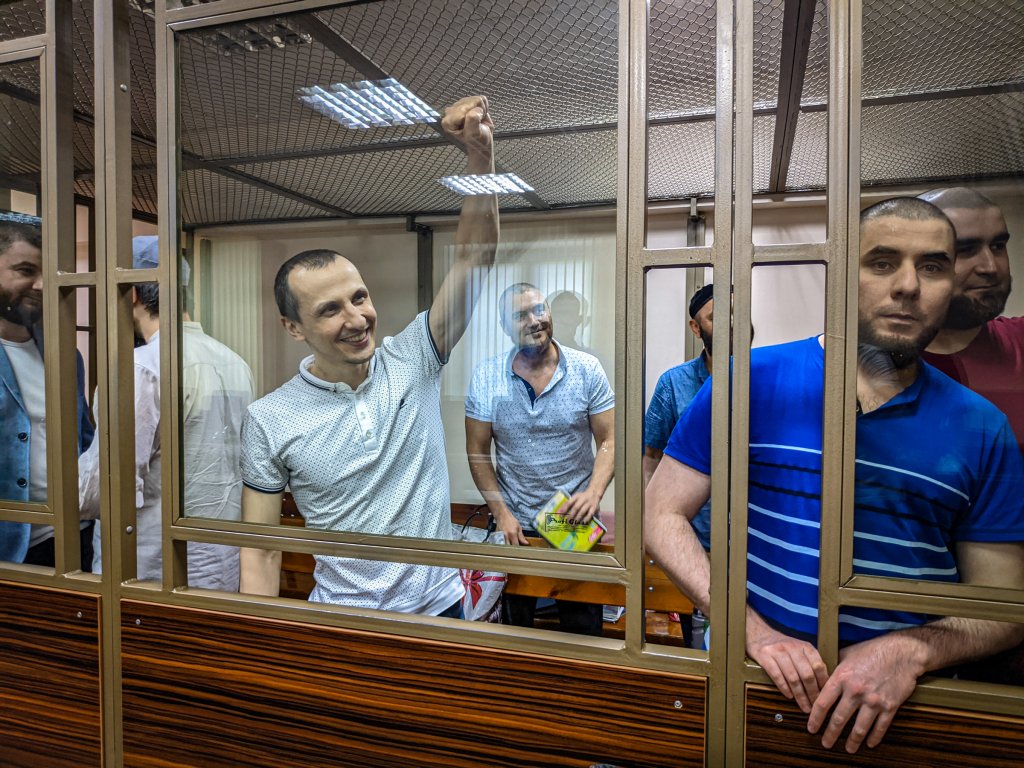
Human rights organizations are using all possible levers of influence to release Server Mustafayev, says his lawyer, Lilya Gemedzhi, in a comment to the NUJU. These are various public actions, appeals to international organizations with appropriate appeals, and communication with international leaders who have the opportunity to help.
According to Lutfiye Zudiyeva, world media organizations that protect journalists’ rights should continue to talk about the pressure on people who cover the situation in Crimea as a systemic phenomenon, forming a certain specific position. And then, in the future, the protection will not concern a specific person whose name and last name are known, but the Crimean Institute of Journalism as a whole, which is now practically destroyed (we are talking about an institute of independent journalism as opposed to one that is financed from the russian budget).
“The list of journalists in prison is growing, and if today it was Server Mustafayev, tomorrow it will be Asan Akhtemov and Vilen Temeryanov, the day after tomorrow – Rustem Ismanov or Dmytro Khyliuk. We understand that the list of these specific names and last names is constantly growing. And, in my opinion, some legal basis is needed for actions by the russian authorities against Crimean journalists,” the human rights activist tells the NUJU.
According to her, Crimea was and is a strategically important peninsula for russia. The Crimean Tatars have always been an obstacle to the conquest of this territory. The struggle for Crimea attempts to subjugate the people and integrate them – all this left its mark and shaped the authorities’ view of the Crimean people. In modern history, Crimean Muslims continue to act as a disloyal layer, and this, naturally, causes a sense of threat in the totalitarian state. It is not for nothing that the Crimean Tatars are rightly called a dissident people because of their struggle, which lasted for decades, for the right to live in their own homes and generally be on the peninsula. Given this collective nature, the ability to unite in a difficult moment, to react quickly, to protect each other – these are the peculiarities of the peoples of Crimea.
“From the point of view of both russian legislation, which is now de facto implemented in the territory of Crimea, and international humanitarian law, to which Ukraine appeals, the persecution of journalists is prohibited. That is, this special group of people should be protected in any conflict. But, unfortunately, practice shows that these measures do not work. Perhaps it would be useful to hold a forum that would unite journalists working on the topic of Crimea in the territories of other countries of the world and media organizations that deal with and monitor the situation with Crimean media workers. This would allow us to discuss the problem of imprisoned Crimean Tatar journalists and their work on the peninsula, – concludes Lutfiye.
NUJU continues to call on human rights organizations to take legal cases against Ukrainian journalists under constant observation, the media to disseminate information about imprisoned journalists as much as possible, and the authorities to make efforts to release the Kremlin’s prisoners through exchanges and negotiations!
You can also find the main materials about Server Mustafayev on this LIST.
Journalists are important! Journalists Matter!
Created as part of the project “Raising awareness among target groups in Ukraine and abroad about Russian war crimes against journalists in 2024 and increasing public pressure for the release of captured journalists”, which is implemented by the National Union of Journalists of Ukraine with support of the Swedish non-profit human rights organization Civil Rights Defenders.
Valeriya Muskharina, NUJU Information Service

 THE NATIONAL UNION OF
JOURNALISTS OF UKRAINE
THE NATIONAL UNION OF
JOURNALISTS OF UKRAINE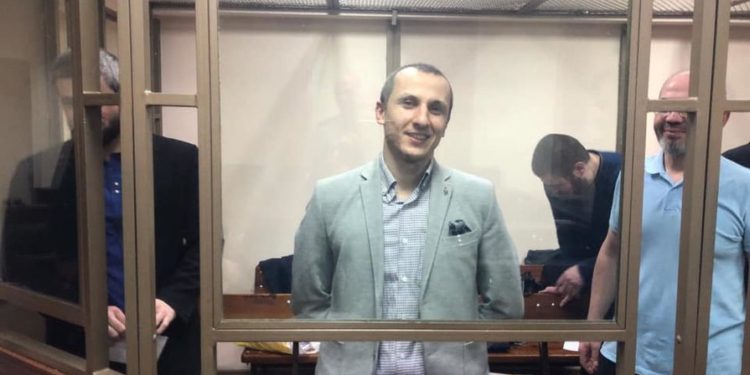


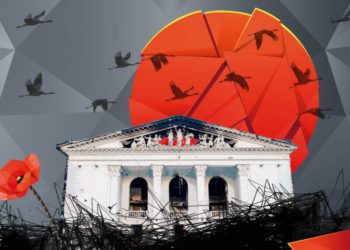













Discussion about this post